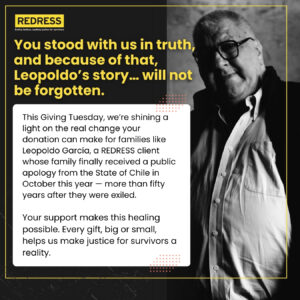
Victims of Al-Hassan Need Victim-Centred and Gender-Transformative Reparation
On 2 April 2012, Ansar Dine and AQIM – armed groups pursuing a jihadist ideology – took control of the city in Timbuktu, northern Mali. Over the following nine months, Ansar Dine/AQIM imposed a system of Sharia-based rules and norms on the population, introducing harsh punishments for non-compliance, including public floggings and arrests., They also forced women and girls into “marriages” with their members – a disguise for subjecting them to rape and sexual slavery. On 26 June 2024, the Trial Chamber of the International Criminal Court (ICC) delivered its judgment against Mr Al Hassan, a high-profile member of Ansar Dine/AQIM’s Islamic police that played a key role in enforcing the group’s rules.
In the first ICC trial that examined a charge of gender-based persecution, the judges acknowledged that Ansar Dine/AQIM specifically targeted women and girls, deprived them of fundamental rights, imposed “specific rules and prohibitions”, and punished violations with “harsh punishment and detention conditions, involving gender-specific violence”. However, while the judges found Al-Hassan guilty of torture and religious persecution, they acquitted him of gender persecution – even though a majority of the judges concluded that members of Ansar Dine/AQIM perpetrated persecution on the basis of gender.
Following the judgement, the Court is now preparing a decision to order reparation for the victims of Mr Al-Hassan’s crimes. REDRESS, together with other organisations and experts led by Women’s Initiatives for Gender Justice (WIGJ), submitted observations in the Al Hassan reparations proceedings before the ICC Trial Chamber. We called on the Chamber to order reparation measures that are survivor-centred, structurally corrective, and gender transformative, to remedy the gender and intersectional harm inflicted on victims.
Gender persecution found by majority of judges
A close look at the Al Hassan judgment reveals that two out of three judges did find that Mr Al Hassan was criminally responsible for persecution on the basis of gender. In addition, all three judges agreed that Al Hassan was criminally responsible for persecution on the basis of religion.
However, one of the two judges who found gender persecution concluded that there were grounds to exclude Mr Al Hassan’s criminal responsibility on all counts — namely duress. This meant that only one judge believed that Mr Al Hassan was both responsible for the crime of gender persecution and that there were no grounds for excluding his criminal responsibility – despite the majority’s finding that gender persecution had been committed and that Mr Al Hassan knowingly contributed to it.
As a result, Mr Al Hassan was not convicted for gender persecution, but he was found responsible for religious persecution.
Key arguments and recommendations
Gendered and intersectional harm. Despite the acquittal on gender-based crimes, the Chamber’s own findings demonstrate that the convicted crimes occurred within a broader context of systematised gendered oppression and intersectional discrimination. The crimes inflicted gendered and intersectional harm on the population, particularly women and girls. The brief highlights the need to address these specific harms through reparation measures.
Presumption of victimhood. Given the Chamber’s finding that the entire population of Timbuktu was subjected to religious persecution, a crime for which Mr Al Hassan was convicted, the brief recommends that the Chamber establish a presumption of victimhood for all individuals who resided in Timbuktu during the temporal scope of the convicted crimes.
Safeguards to prevent re-traumatisation. With Mr Al Hassan’s original sentence reduced by 12 months, and his potential return to the community where the crimes took place and where victims still reside, the reparation process must include safeguards to prevent re-traumatisation and intimidation and ensure adequate psychosocial support to victims.
Meaningful and safe participation of women. Reparation measures must also amplify women’s and girls’ voices in communities and reinforce victim-led initiatives that challenge discriminatory norms. It is key to ensure women’s full and safe participation in the design, implementation, and monitoring of reparative measures.
Victim-centred, gender-transformative, and contextually relevant reparation measures co-created with victims. ICC reparation measures must meaningfully and comprehensively address the resulting harm of Mr Al Hassan’s crimes and its impact on education, health, socio-economic rights, and family life of the population of Timbuktu, including women and girls. To achieve this, reparation measures must be victim-centred, gender-transformative, and culturally and contextually relevant. They must be co-created with victims – a principle that is inherent to the ICC’s existing legal framework.
Key dates
April 2012 – January 2023: Timbuktu is de facto under the control of Ansar Dine/AQIM. Mr Al Hassan quickly rises to become the de-facto chief of the group’s Islamic police.
31 March 2018: Arrest. Mr Al Hassan has surrendered to the ICC.
14 and 15 Jul 2020: Trial opens. The Legal Representatives of Victims represented 2,196 victims in the case.
26 Jun 2024: Trial judgment: Mr Al Hassan is convicted of the crimes against humanity of torture, persecution and other inhumane acts; and the war crimes of torture, outrages upon personal dignity, mutilation, and cruel treatment.
20 Nov 2024: Sentencing judgment: Mr Al Hassan is sentenced to 10 years of imprisonment.
Amici Curiae observations in the case of The Prosecutor v. Al Hassan were submitted pursuant to the Article 75 of the Rome statute by Mama Koité Doumbia; Association des Femmes pour les Initiatives de Paix (AFIP); Groupe de Recherche, d’Etude, de Formation Femme-Action (GREFFA); Women’s Initiatives for Gender Justice (WIGJ); International Federation for Human Rights (FIDH); REDRESS; Lawyers Without Borders Canada (LWB Canada); Alexandra Lily Kather; Sareta Ashraph.
You can read the full submission here.

